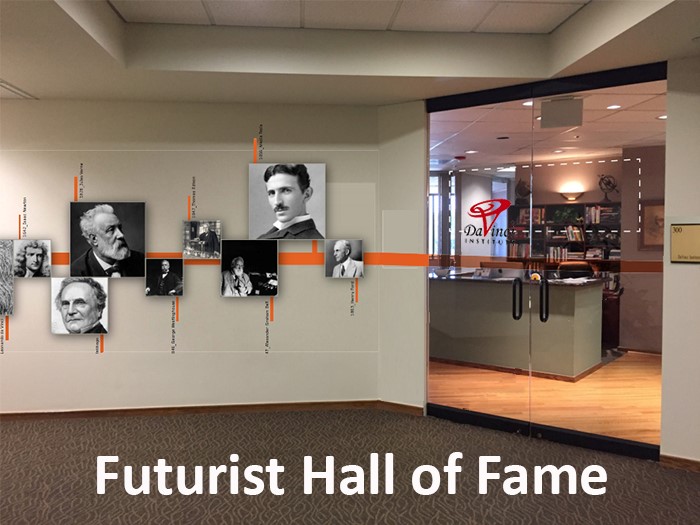Introducing the Futurist Hall of Fame
It will be a celebration of the future
Thomas Frey //March 11, 2016//


Introducing the Futurist Hall of Fame
It will be a celebration of the future
Thomas Frey //March 11, 2016//
Over the coming months, the DaVinci Institute will be unveiling the world’s first Futurist Hall of Fame.
As with other “hall of fame” efforts, this one will be dedicated to drawing attention to those who have contributed the most to our thinking about the future.
To be sure, the first iteration of this Hall of Fame will be meager. It will be a hall with photos and videos not sculptures, homegrown narratives instead of meticulously crafted storylines, and self-guided tours through an online app that we will create in-house.
It will be open to the public during normal business hours, and it will be free.
While we have hopes of growing it into a stand-alone facility with museum-quality displays, our primary focus for now will be to create a respectable starting point along with all of the necessary systems in an organization that will live on into perpetuity.
The initial set of inductees will have one thing in common: They will all be deceased. Once a more formal induction committee and process are in place, many of my esteemed colleagues, alive today, will find their way into the Hall of Fame as well.
We also want to draw attention to the future. Many of today’s technologies, demographic shifts and political decisions will have dire consequences if we do not do a good job of anticipating and managing their implementation. As our awareness grows, and our technological impact spreads exponentially further, it becomes our responsibility to do an increasingly better job of managing the future.
At the same time, we view this as a celebration of the future. Our future is only as bright as we make it and our efforts to study and analyze the future can put us on the path to a truly brilliant world ahead.
Selecting and Nominating Important Futurists
Since the terms “futurist” and “futurology” have only been around since the 1940’s, with only limited usage until the 1980's, few people before then were considered futurists even though many exhibited the same forward thinking qualities.
As an example, Leonardo da Vinci dedicated over 35,000 words and 500 drawings to the concept of flying even though he lived over 300 year before the first hot air balloon flight and 400 years before the Wright Brothers.
Da Vinci is perhaps the world’s best-known futurist even though few describe him in terms other than artist, inventor and painter.
Consequently there is a significant difference between having a macro-perspective of those displaying big picture foresight capabilities, and micro-perspective thinking about those more directly affiliated with the futurist community.
With that in mind, here are the people that we’d like your input on, as a starting point, for phase one inductees in the Futurist Hall of Fame. Keep in mind that we are beginning with people who are no longer alive that displayed unusual talent and insight for thinking about the future.
This list is in chronological order by date of birth.
- 287 BC – Archimedes – Ancient Greek mathematician, physicist, engineer, inventor, and astronomer.
- 1452 – Leonardo da Vinci – Italian visionary best known for his futuristic designs, invention, painting, sculpting, architecture, science, music, mathematics, engineering and much more.
- 1642 – Isaac Newton – English physicist and mathematician widely recognized as one of the most influential scientists of all time.
- 1791 – Charles Babbage – British mathematician, philosopher, inventor and mechanical engineer best known for originating the concept of a programmable computer.
- 1815 – Ada Lovelace – British mathematician and writer who played a significant role in developing Charles Babbage's early mechanical general-purpose computer, the Analytical Engine.
- 1828 – Jules Verne – French novelist, poet, and playwright best known for his adventure novels – Journey to the Center of the Earth, Twenty Thousand Leagues Under the Sea, and Around the World in Eighty Days – and his profound influence on the literary genre of science fiction.
- 1846 – George Westinghouse – American entrepreneur and engineer who invented the railway air brake and was a pioneer of the electrical industry focused on alternating current.
- 1847 – Thomas Edison – American inventor and businessman who developed many devices that greatly influenced life around the world, including the phonograph, the motion picture camera, and the electric light bulb.
- 1847 – Alexander Graham Bell – Scottish-born scientist, inventor, engineer and innovator who is credited with patenting the first practical telephone.
- 1856 – Nikola Tesla – Serbian American inventor, electrical engineer, mechanical engineer, physicist, and futurist best known for his contributions to the design of the modern alternating current electric system.
- 1863 – Henry Ford – American industrialist and founder of the Ford Motor Company, best known for perfecting the assembly line and mass production as a way of bringing automobile transportation to the masses.
- 1866 – H. G. Wells – British writer and novelist best known for his visionary science fiction books – The Time Machine, The Island of Doctor Moreau, The Invisible Man, and The War of the Worlds.
- 1867 – Marie Curie – French physicist, chemist, and first woman to win a Nobel Prize for her pioneering research on radioactivity.
- 1879 – Albert Einstein – German-born theoretical physicist who developed the general theory of relativity, one of the two pillars of modern physics. Einstein's work is also known for its influence on the philosophy of science.
- 1895 – Buckminster Fuller – American architect, systems theorist, author, designer, and inventor best known for his work on geodesic domes, and popularizing terms such as "Spaceship Earth", ephemeralization, and synergetic.
- 1900 – Dennis Gabor – Hungarian-British electrical engineer and physicist, most notable for inventing holography, for which he later received the 1971 Nobel Prize in Physics.
- 1901 – Walt Disney – American entrepreneur, cartoonist, animator, voice actor, and film producer best known for creating Disneyland and his visionary thinking about future entertainment.
- 1903 – George Orwell – British novelist, essayist, and journalist best known for his visionary books – Nineteen Eighty Four, and Animal House.
- 1903 – John von Neumann – Hungarian-American mathematician, physicist, inventor, computer scientist, and polymath best known for his visionary work on game theory and the Manhattan Project.
- 1906 – Grace Hopper – American computer scientist and United States Navy Rear Admiral best known for her work inventing the computer compiler and developing COBOL, one of the first high-level programming language.
- 1907 – Robert A. Heinlein – American science fiction writer often referred to as the "dean of science fiction writers."
- 1911 – Marshall McLuhan – Canadian professor of English, philosopher of communication theory and a public intellectual. His work is viewed as one of the cornerstones of the study of media theory.
- 1912 – Alan Turing – Pioneering British computer scientist, mathematician, logician, cryptanalyst and theoretical biologist. Inventor of the “Turing Test.”
- 1917 – Arthur C. Clarke – British science fiction writer, science writer and futurist, inventor, undersea explorer, and television series host. Best known for writing 2001: A Space Odyssey.
- 1918 – Richard Feynman – American theoretical physicist known for his work on quantum mechanics and the theory of quantum electrodynamics. Often referred to as the grandfather of nanotechnology.
- 1920 – Isaac Asimov – American author and professor of biochemistry at Boston University, best known for his prolific works of science fiction and for his popular science books.
- 1921 – Gene Roddenberry – American television screenwriter and producer best remembered for creating the original Star Trek television series.
- 1922 – Herman Kahn – Founder of the Hudson Institute and one of the preeminent futurists of the latter part of the twentieth century. He originally came to prominence as a military strategist and systems theorist while employed at the RAND Corporation.
- 1924 – Benoît Mandelbrot – Polish-born, French and American mathematician best known as the grandfather of fractal geometry. He also discovered the “Mandelbrot Set” of intricate, never-ending fractal shapes.
- 1925 – Douglas Engelbart – American engineer and Internet pioneer best known as the inventor of hypertext and the computer mouse.
- 1928 – Philip K. Dick – American science fiction writer best know for the blockbuster Hollywood movies produced from his scripts – Blade Runner, Total Recall, A Scanner Darkly, Minority Report, Paycheck, Next, Screamers, The Adjustment Bureau, and Impostor.
- 1934 – Carl Sagan – American astronomer, cosmologist, astrophysicist, astrobiologist, author, science popularizer, and science communicator in astronomy and other natural sciences.
- 1942 – Michael Crichton – American best-selling author, physician, producer, director and screenwriter, best known for his work in science fiction, medical fiction, and thriller genres.
- 1955 – Steve Jobs – American entrepreneur, co-founder, chairman, and chief executive officer of Apple Inc.
Final Thoughts
Deciding on the first phase of inductees will set the stage for a number of follow-on projects. Besides asking for your input on the above list, we will be asking key individuals for help to form a long term organization complete with systems and procedures that will keep it operating for centuries to come.
As we are able build out the first phase of the Futurist Hall of Fame, we will keep everyone informed about how this will fit into some of our larger plans for a stand-alone facility. Please take a moment and let us know your thoughts. Your insights and recommendations are greatly appreciated.


























